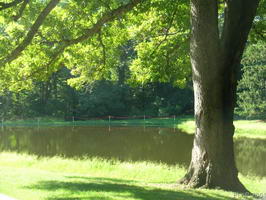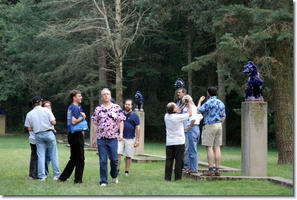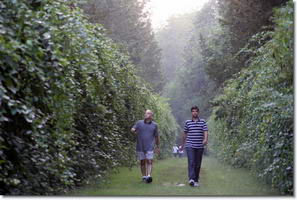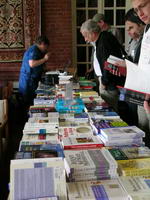**Important Dates**
Click to Expand- April 4
- PLoPourri proposals open, no due dates
- June 28-July 3
- Paper submissions due
- July 5
- Shepherding begins
- July 5
- Registration opens
- August 23
- Last draft due for review
- August 30
- Notification of acceptance
- August 23
- Deadline focus groups/
workshop proposals - September 10
- Conference versions due
- September 24 - October 1
- Writers' Workshops
- October 5-7
- PLoP Conference days
- December 7
- Proceedings version due
ACTIVITIES
PLoP conferences are typically made of a set of activities that altogether promote a friendly and effective environment to share expertise, give and get feedback:
- Writers' Workshops review pattern papers
- Writing Group helps evolving patterns
- Focus Groups embrace challenging topics
- 'Birds of a Feather' (BoF) let you informally organize your own session
- BootCamp helps introducing patterns to newcomers
- Games exercise your body and mind
- Gifts to give and get
- Other activities reinforce a community of trust.
Writers' Workshops
Writers' workshops are used by the pattern community to improve our patterns. These workshops are the primary focus of our time at PLoP and in them we discuss accepted papers. Authors will be assigned to a writers’ workshop and are expected to attend all sessions in that workshop. All other conference attendees are encouraged to attend one or more writers' workshop sessions, preferably choosing to read and review papers where they can contribute. Paper assignments to workshops will be posted before the conference.
The format of Writers' Workshops has been adopted from poetry review. Each writers' workshop contains 3 to 5 papers, which authors must read before the conference to be able to give each other feedback on their work in a peer review session of around one hour per paper. Richard Gabriel has written a book on writers workshops.
Each writers’ workshop is led by a moderator. As PLoP is a virtual conference, workshop moderators will have flexibility in scheduling workshop sessions. They will do their best to accommodate everyone’s constraints and timezone challenges.
In each session, the authors of the paper under discussion remain (mostly) silent while the others discuss it and explain additional insights and views they have about it. Depending on the workshop moderation style, authors may be brought into the discussion to gain insights and clarity about their intentions for their work. From these sessions, authors get a lot of feedback and suggestions about how they can improve their work.
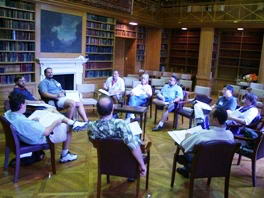
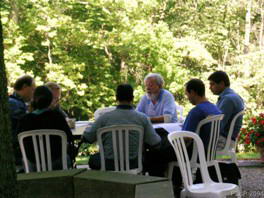
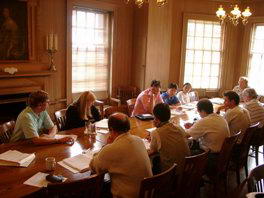
A fruitful participation in a Writers' Workshop session requires you to read the papers in advance and to take some notes on what you liked about the papers and what you think needs improvement. Since there's no reading time during the Writers' Workshops and experience shows that chatting with others or meeting people is much more fun than being alone reading papers, do yourself a favor and read the papers of your Writers' Workshop in advance.
To know more about Writers' Workshops you can read an excellent introduction by Doug Schmidt. Jim Coplien has also written a pattern language for Writers' Workshops that offers insight into the reasons behind the process we use.
Writing Groups
Writing groups aim at providing authors the opportunity to work on their patterns in an interactive session mentored by an experienced author specifically assigned to each group.
Papers on the writing groups are typically papers that, at the end of the shepherding process, were considered that would profit more from an interactive session to work on the paper than from a writers’ workshop. After the work done in the writing group, some papers will be selected to be discussed in the final session.
Focus Groups
Focus groups are free-format discussion groups or workshops aimed at bringing together people interested in a hot topic related to patterns or proven practices, for a period of about two hours.
These sessions might focus on very different topics and issues related to patterns, ranging from writing to using, organizing, or adopting patterns. Some focus groups may require preparation or submission before the conference, while others are fine if you just show up, interested in the topic. Interdisciplinary topics and topics from other domains than software development are common and encouraged. Focus group leaders write a report that is included in the final conference proceedings.

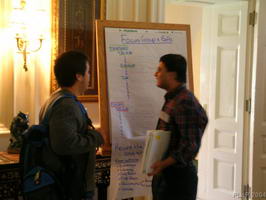
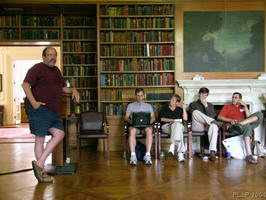
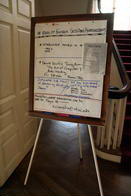
BoF sessions
'Birds of a Feather' is a shortening of the proverb "Birds of a feather flock together.", meaning that people (birds) of the same kind or interest (of a common feather) enjoy spending time (flocking) together.
BoF sessions are informal meetings, usually scheduled and organized on site, where people group together based on a shared interest and carry out discussions without any pre-planned agenda. This year at virtual PLoP we will have a zoom room available for informal BoF sessions as well as a place where you can hang out and join others in conversation.
BootCamp
The session will provide an introduction to patterns where participants will be immersed in patterns and emerge with an enlarged perspective, their first pattern, and an ability to get more out of the PLoP conference.
Games
Games are a well-established activity at PLoP. Some games have become 'traditions', while others will be surprises.
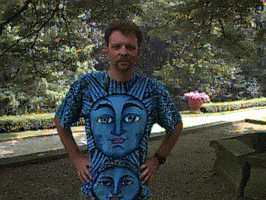
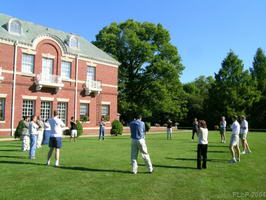

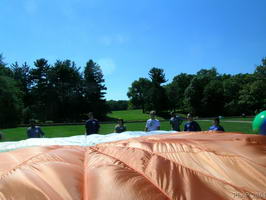
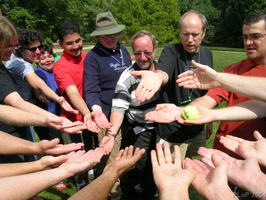
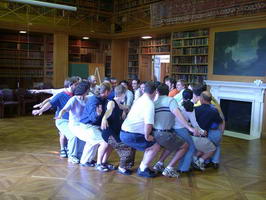
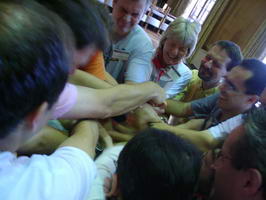
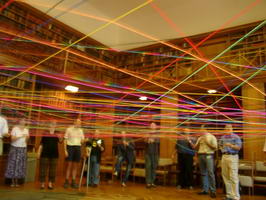
Games reflect one of the unique features of the PLoP™ series of conferences, which is the emphasis placed on non-technical activities that try to create an environment that let us know each other, activate the right halfs of our brains, and build up a community of trust.
Come with an open mind and prepare to engage in some fun time with your fellow PLoPers. Unforgetable!
Gifting
If someone gives you something ... pass it on
Gifting is a custom of many societies of giving visitors and friends small tokens of friendship. This custom began with PLoP'97. PLoP attendees should bring about 20 small gifts that represent themselves, their work, or their companies. Suggested gifts range from hats to T-shirts, from toys to trinkets, from pens to pencils, from abaci to zirconium.
This year, as we are a virtual conference, it will be difficult to continue this tradition in person. However we will have a session on the first day where we get to know each other. We encourage you to attend and gift your fellow attendees with appreciations and share some things about where you are from.
Other activities
PLoP will be an exciting time for many pattern authors. We may encourage other activities on an ad hoc basis. We will also have a slack channel where attendees can share. More information will be revealed at the conference or shortly beforehand.
